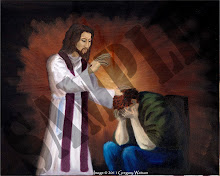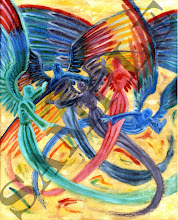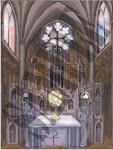"The slovenliness of our language makes it easier for us to have foolish thoughts." --George OrwellFurther to the infamous video, I wanted to offer a couple more thoughts--not to Bethke himself, per se, but in regard to a couple of conversations that I've had about it with a few friends.
One conversation in particular revolved around the simplicity of the message. When I made the point about Bethke's misuse of the term "religion" to mean hypocrisy, and therefore leading him to get down on religion in general rather than those who practise their religion poorly, a friend responded by saying Bethke was preaching a "simple" message geared toward people who weren't familiar with Christianity. He made the point that we have to start somewhere when presenting the faith--that we have to tell them in what, exactly, we're trying to convince them to put their faith in the first place. As such, with that goal in mind, Bethke could hardly be faulted for emphasising Jesus over and above "religion". He went on to say that in the popular culture, "religion" is often automatically associated with all the negative connotations that Bethke rebukes in his video, and therefore when we present the message of the Gospel, we should try to shy away from the "religious" association in order to make the message more palatable.
He wrote,
"Religion" is a heavy word. Those of us who believe will ultimately all admit that the word "religion" carries with it a lot of baggage. When I am doing bar ministry and someone says "You sing about Jesus, you must be religious then" I shudder and typically outline the differences between hollow "religion" and real relationship with Christ.My friend's reference to "Bar Ministry" reminded me of another scene of ministry taking place in a bar (or tavern, at any rate). This one occurred roughly 700 years ago, and yet the situation is startlingly relevant, I think.
In the Middle Ages, the Catholic Church had risen to a status of temporal power that it had never before seen, and, hopefully, never will again. I say hopefully never again, because the worldly ties possessed by the Church tended to make her leadership become all too worldly. Bishops, priests, even popes, were living lives of sinful avarice and lust. While the Holy Spirit, as He does in every age, preserved the Church from abandoning the Faith, nevertheless, the so-called "religious" of the day were living lives that were anything but! Even the monastic orders had traded in their vows of poverty for opulence.
In this milieu of decadence arose a heresy, known as "Catharism" or "Albigensianism". The Cathari (i.e. "Pure Ones") stressed a spiritual relationship with Jesus over and above the trappings of the world and of the religious institution of the Church. In fact, they went so far as to deny the goodness of the world, living incredibly austere and ascetic lives of fasting and penance, in order to demonstrate their revulsion for their flesh, and their desire to die so their spirit could be with God. The Catholics, especially the clergy, in their hypocritical decadence, were hard pressed to offer any compelling rebuttal against the Albigensian rigourism. And many Catholic laypeople, seeing the hypocrisy of their leaders, and the apparent holiness of the heretics, were scandalised by the Church and led to embrace this heresy.
But in every age, when the priest has abandoned the truth, God raises up prophets to call him, and the people, back to the true life of the Gospel. To rebuke the Church, and to resist the Cathari, Our Lord raised up just such a prophetic voice in the person of St. Dominic de Guzman. Travelling through France (the center of the Albigensian heresy) on an ecclesiastical mission from Spain to Scandinavia, St. Dominic encountered the devastating effects of Albigensianism. Dominic very clearly felt the call of God to stay in France and help preach the Truth. In order to be more compelling to the heretics and to the people of the day, Dominic adopted a severely ascetic lifestyle, taking strict vows of poverty. He started the religious community that bears his name, the Dominicans, or the Order of Preachers, and sent them out to preach to all people. He preached a simple Gospel as contained in and exemplified by the Rosary and its mysteries of the Life of Christ. His zeal, his holiness, and his preaching won back many heretics to the truth of the Catholic faith--but the most effective witness was his life of lived charity and sincerity.
While St. Dominic's preaching was simple enough so that the masses could understand and be converted, unlike Jeff Bethke, he never compromised the Message to suit the prevailing attitudes of the day. When the people of the day saw the hypocritical way that the clergy were living, and rejected the Church because of the scandal, St. Dominic didn't respond by saying, "Jesus came to abolish religion. It's not about religion but about a relationship with Jesus!" Instead, St. Dominic became more religious! He combatted hypocrisy by living Religion faithfully, sincerely, and cheerfully!
One such instance of St. Dominic's cheerful ministry brings us right back to my friend's comments about the person in the bar who automatically associates "religion" with "hypocritical legalism" or some such thing. During his missionary travels through the south of France, St. Dominic and a companion lodged in an inn owned and run by an Albigensian. St. Dominic engaged the owner in conversation about their respective beliefs. The whole night long, Dominic patiently proclaimed the love, truth, beauty, and freedom of the Catholic religion. Neither excusing the laxity and hypocrisy of the clergy of his day, nor denigrating the Catholic religion as a whole based on that scandalous hypocrisy, Dominic carefully and lovingly explained the Truth. And when morning came, the tavern in which he was preaching was owned and run by a Catholic!
My friend is right--people do have a dismal perspective on religion--especially the Catholic religion these days. Ironically, there's significantly less reason to have such an opinion today than there was in the 1200s! Nevertheless, these negative associations persist. Is the cure for the problem my friend's, and Bethke's, solution, to create a false dichotomy between the Religion that Jesus founded, and Jesus Himself? Is it to play word games with "Religion", to make it mean something that it doesn't, simply in order to tickle the ears of our audience? Or is the real solution, St. Dominic's solution? To preach the Truth with love, patiently, sincerely, and joyfully? To fearlessly and tirelessly preach the Simple Gospel, but accurately and clearly, and not oversimplifying it?
If lazy language does indeed cause foolish thinking, as George Orwell prophetically warned, then the real witness to the Gospel must present that Gospel faithfully, articulately, and sincerely. With reverence for our hearers, let us clearly elucidate the Truth, in a way that they will understand, but without compromising. And above all, let us follow the example of St. Dominic. Let us live the Truth.
Truth: Study it. Live it. Preach it.







1 comment:
What an amazing post. Best I've read here yet. Top 3 anyway.
BTW many blessings on your work on this fine blog on its patronal feast day.
I never thought to compare the current state of vapid idiocy in public religious discourse with the environment in France at the time of the Albigensians. It's a great and helpful comparison.
In Bible College, this very episode was presented as an example of religious intolerance and political self preservation. The "I" word was used a lot.
Post a Comment